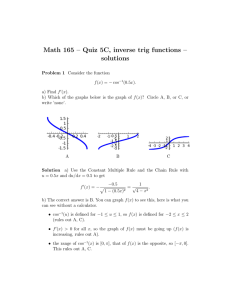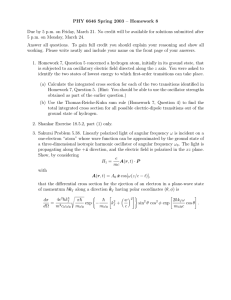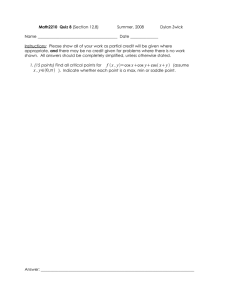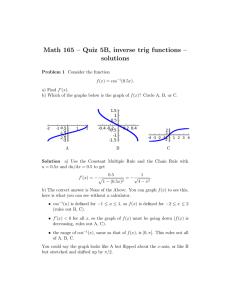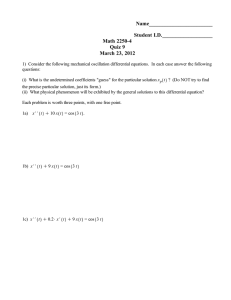Announcements 10/29/12 Prayer hours
advertisement
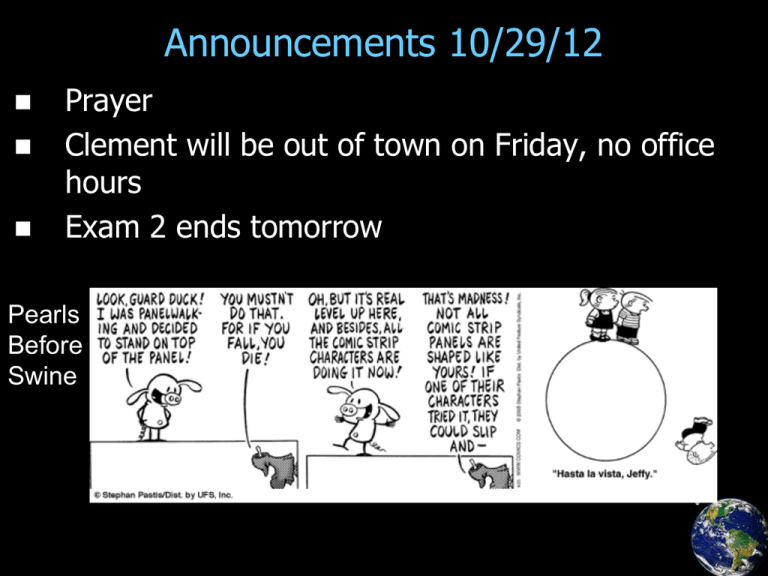
Announcements 10/29/12 Prayer Clement will be out of town on Friday, no office hours Exam 2 ends tomorrow Pearls Before Swine From warmup Extra time on? a. polarization by reflection (3 students) Other comments? a. Do we really have homework due on a national holiday? From warmup What does it mean to say that a given light beam is polarized? Or unpolarized? a. If it is polarized, the electric field vibrates in only one plane. If light isn't polarized, the electric field is free to vibrate any which way it likes. mostly correct Horizontally Polarized Light Credit: the next few slides are from Dr. Durfee Vertically Polarized Light Diagonally Polarized Light Circularly Polarized Light Elliptically Polarized Light Unpolarized Light Clicker question: What type of polarization is displayed in the animation? http://stokes.byu.edu/teaching_resources/emwave_flash.html a. b. c. d. e. Horizontally polarized Vertically polarized Diagonally polarized Circularly polarized Non-polarized Circularly Polarized, pictures Pictures from Wikipedia Polarizers Crystals Lines Polaroid of wires film Polaroid Film Crystals www.thorlabs.com Clicker question: If you send horizontal linearly polarized light through a (perfect) vertical polarizer, how much of the light intensity will get through? a. 0-20% b. 20-40% c. 40-60% d. 60-80% e. 80-100% Clicker question: If you send horizontal linearly polarized light at 45 through a perfect vertical polarizer, how much of the light intensity will get through? a. 0-20% b. 20-40% c. 40-60% d. 60-80% e. 80-100% Clicker question: If you send circularly polarized light through a perfect vertical polarizer, how much of the light intensity will get through? a. 0-20% b. 20-40% c. 40-60% d. 60-80% e. 80-100% Clicker question: (Like HW 27-2) If you send horizontal linearly polarized light through a vertical polarizer, no light gets through because there is no component of the electric field in the light wave that is oscillating vertically. If you insert a diagonal polarizer at 45 between the two, how much of the light intensity will now get through the final polarizer? a. 0-20% b. 20-40% c. 40-60% d. 60-80% e. 80-100% Demos Polarization configurations From warmup: In the discussion accompanying the figure shown above, the text explains how a certain reflection angle can lead to polarization. In your own words, explain how this works. a. When waves are reflected off of surfaces, the parallel [to the surface] component reflects more strongly than the perpendicular [to the first component] component. b. At a certain angle, the only light that reflects must be oriented parallel to the surface. Kind of like how a flat, horizontal rock is the best to skip across water. Remember these? (Fresnel Coefficients) If near perpendicular (1-D problem) v2 v1 n1 n2 r v1 v2 n1 n2 When/what is phase shift? R r 2v2 2n1 t v1 v2 n1 n2 2 T 1 r 2 For arbitrary angle (you don’t need to know for this class) n1 cos1 n2 cos2 rs polar . n1 cos1 n2 cos2 ts polar . n1 cos2 n2 cos1 rp polar. n1 cos2 n2 cos1 2n1 cos1 t p polar. n1 cos2 n2 cos1 2n1 cos1 n1 cos1 n2 cos2 What is s-polar? What is p-polar? Plots for air (n=1) to glass (n=1.5) s-polarization p-polarization field amplitudes vs field amplitudes vs 1.0 t 0.5 t 0.8 0.6 20 40 60 80 r 0.5 0.4 r 0.2 20 1.0 40 60 80 0.2 intensities vs Do you always intensities get a 180 phase shift1.0upon reflection?0.8 1.0 T 0.8 0.6 0.6 0.4 0.4 R 0.2 20 40 vs T R 0.2 60 80 Brewster’s angle! 20 40 60 80 Fresnel Coefficients, cont. If near perpendicular (1-D problem) v2 v1 n1 n2 r v1 v2 n1 n2 R r 2v2 2n1 t v1 v2 n1 n2 2 T 1 r 2 For arbitrary angle (you don’t need to know for this class) n1 cos1 n2 cos2 rs polar . n1 cos1 n2 cos2 ts polar . 2n1 cos1 n1 cos1 n2 cos2 n1 cos2 n2 cos1 2n1 cos1 rp polar. t p polar. = 0, apply Snell’s Law… n1 cos2 n2 cos1 Set numerator n 1 cos 2 n2 cos1 a bit of algebra/trig… tan1 = n2/n1 Clicker question: If you send an unpolarized beam at a piece of glass at Brewster’s angle, what happens? a. The reflected beam is partially polarized b. The reflected beam is completely polarized c. The transmitted beam is partially polarized d. The transmitted beam is completely polarized e. More than one of the above “Brewster windows” p-polarization If you send p-polarized light towards a piece of glass at Brewster’s angle, how much gets transmitted? 1.0 t 0.8 0.6 0.4 r 0.2 20 40 60 80 0.2 1.0 T 0.8 0.6 0.4 R 0.2 20 40 60 80 Clicker question: In polarized sunglasses, some of the glare from the sun is eliminated when the sun is directly in front (and above) you. Should the polarizing material be aligned to allow vertical or horizontal electric fields through? a. vertical b. horizontal Demo Flashlight reflecting off of glass
